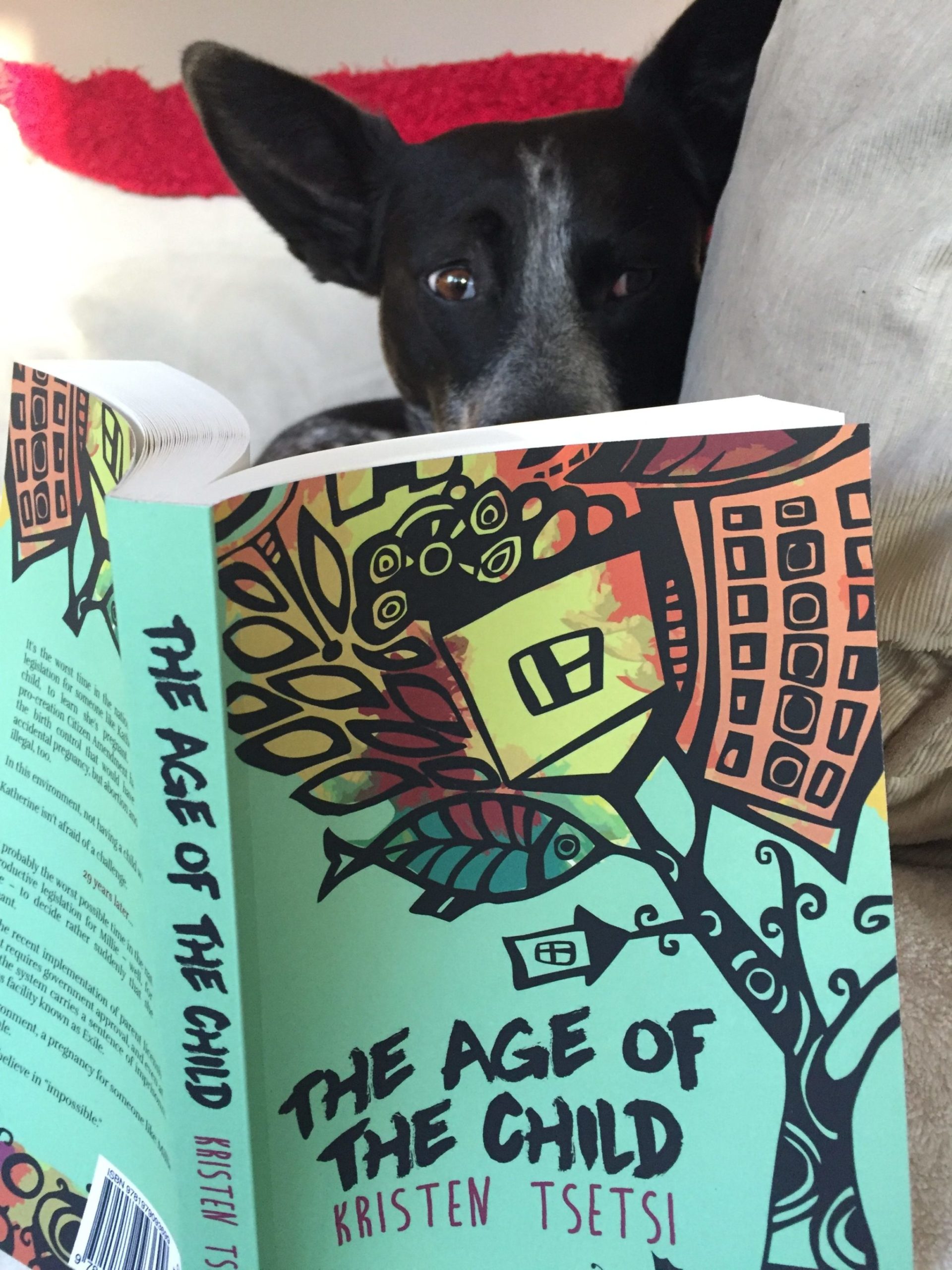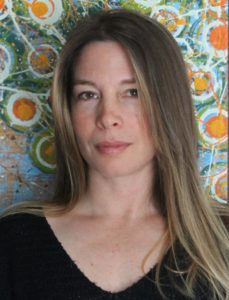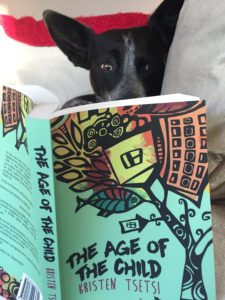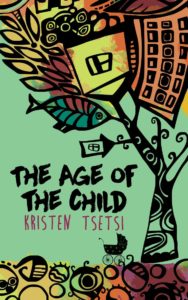
Happy New Year!
It’s been a while since I’ve written here but I’m returning to share a conversation I’ve been having with Kristen Tsetsi, author of The Age of the Child, a novel that got me off to a thoughtful start for the year. In her novel, Tsetsi asks a provocative question: what if those of us who want to be parents had to get a license to do it?
Tsetsi’s novel takes place in a near-enough future to recognize many of the conditions that prevail today with a few key differences. She’s given herself freedom to imagine first what would happen if all forms of contraception were illegal and then to explore the natural response to the challenges that follow. What makes the story compelling, though, is how Tsetsi leads us through this world first through a mother, and then through her daughter so that we see how they struggle to live with themselves and each other within the confines of their world. The most poignant moments are the moments of connection and missed connection between each other but also with others. Tsetsi’s spare, skillful prose lets them struggle in front of us so that we become like people behind a two-way mirror. We can see what is happening, why it is happening, and, hearts rising to our throats, want to call out to these people. But they can’t hear us.
When we are through, though, we are thinking hard about things we’ve heard many say and things we’ve thought or said ourselves about children or parenting. We’re tempted into a conversation that we’ve not had with spouses, friends, or acquaintances. This is a book for those who like to dig into a good story but also to be challenged by “what if” questions that evoke a future that may be closer than we imagine. Perfect for book clubs. If you’d like to invite her to join you and your fellow readers, email her here: kris@kristenjtsetsi.com.
If you’d like to enter to win a free, signed copy of The Age of the Child, I’ll be drawing a winner from current and new newsletter subscribers. To subscribe, all you have to do is go here: subscribe.

Here is a recent interview I had with Kristen Tsetsi about her novel, her writing process, and her dog Lenny who inspired the name for one of the characters and who inspires me to smile daily on Instagram. Kristen is smart, insightful, and witty as her followers of her blog, Facebook page, and Instagram can testify. She loves doing book clubs. Learn more about her, The Age of the Child, and more of her work at https://kristenjtsetsi.com/.
Q: You’ve mentioned in your blog that the seed for this novel came from a common phrase uttered whenever we encounter a parents we think are making mistakes or violate social norms, “think of the children.” I confess, versions of this has crossed my mind at times. What is it about this that compelled you to write about a world in which the government actually regulates who can become parents and who can’t?
A: Well, it’s hard not to imagine that world when we’re in a world right now in which many people want the government to regulate the choice to not parent. The idea of abortion—and in some cases, hormonal birth control—is so abhorrent to them that it feels perfectly legitimate to create a tiered system of rights: first rights to the unborn. The personal bodily rights of anyone with a uterus come second. It makes sense to them, because they’re “thinking of the children.”
“But there’s a flip side to “thinking of the children,” and it’s the one that concerns itself with walking, talking, breathing young people.”
Obviously banning birth control and criminalizing abortion pose no problem for those who welcome the choice to have oodles of children, but it’s horrifying for someone like The Age of the Child’s Katherine, who discovers that the clinic where she had an appointment for an abortion, one of the last remaining, has been forced by law to close.
But there’s a flip side to “thinking of the children,” and it’s the one that concerns itself with walking, talking, breathing young people.
This is where we as a society are lacking.
Not only do we accept without question that having kids is “just what people do,” but there’s also a lot of pressure out there to conceive (and then to conceive again).
Take, for one of many examples, Kathleen Parker’s Washington Post opinion piece, On Pleasure and Parenthood, in which she writes, “Parenting surely isn’t for everyone, and those who choose to be child-free probably have made the right decision. Then again, it’s hard to know for certain that one doesn’t want children. Many don’t, until they do.” (My response.)
This implication: “All women should want children. If they think they don’t, they should have one so they know for sure.”
As if inviting millions of strangers to bring innocent, vulnerable, helpless human beings into conditions unknown carries the consequent weight of, “You have to try that hot pepper. Oh my god, it’s crazy hot. Try it!”
In my opinion, that doesn’t reflect much thought for the children.
I wondered, “What would it look like to put the quality of life of children first, before the biological needs and baby longings of adults?”
After many years of trying it one way, the government in The Age of the Child decides, having seen the results of their legislation, there must be a better way. The only way, as they see it, is licensing.
Which is no problem at all for those who don’t want children (or any more children than they already have), but Millie happens to exist in this time, and it’s a terrible time for someone like her to want to be pregnant.
Q: I’m sure there are as many situations as there are parents. As you developed your characters and their dilemmas, did you draw on parents or people you’ve observed? Did you find yourself having long thoughtful conversations with friends or friends of friends that yielded insights you ended up incorporating into your novel? How much of yourself and your own experience is in this novel?
A: Two friends I’ve had for years are parents, and I’ve been lucky to hear them talk to me about their amazing kids from the time they were very young until now (one brother and sister are in their early twenties and the other brother and sister are in their late teens).
One of those friends, I’ll call her Helen, told me a story about a work acquaintance she visited one day after work. While there, Helen witnessed the treatment of her co-worker’s son. The father didn’t feed their son food – he fed him candy fruit snacks. Regularly, as meals. The father, when asked by his wife why he hadn’t made their son a sandwich while she was at work, said he hadn’t felt like it and, frankly, didn’t see why anything about his life or his schedule should have to change just because they had a child.
You’ll probably recognize the Age of the Child character that family inspired.
While writing, I had long conversations with the other friend, Danielle (named in the dedication), about pregnancy, childbirth, and the little things babies do that are unique to their personalities. If I got stuck on a spot while I was in the middle of a scene about a pregnant Katherine, I’d send her a text. I couldn’t have written Katherine’s pregnancy, post-childbirth, or baby-tending without her. Or the book itself, really.
I’ve also been someone’s child but not a mother, which might make it a little easier to imagine (or remember having) a child’s perspective, because it’s free from the filter of parenthood. And as someone who’s never wanted children, I had intimate insight into Katherine’s feelings about becoming a parent.
Q: An author takes risks when writing about controversial subjects or a big idea — the ability to balance the subject or idea with all the elements that make a good story is really important. Luckily, you have found a way to marry both — did you find yourself struggling with this at all during the writing of Age of the Child? Did you ever find yourself considering choices that might serve the idea at the expense of the story or vice versa?
A: Thank you for saying that!
I think consciously thinking about an issue while trying to write a story could make it too tempting to get hung up on everyone’s political or moral arguments. The preaching from all sides would take over and the characters would get lost. I like to keep whatever the issue is – whether “thinking of the children” or, as in Pretty Much True, trying to put a spotlight on an under-explored wartime experience – in the background of my mind and in the background of the story, too, and to concentrate only on the lives being affected. “This is the situation. What would people do, how might they behave, how would they be personally impacted, in this situation?” That’s all I think about.
“This is the situation. What would people do, how might they behave, how would they be personally impacted, in this situation?” That’s all I think about.’
Q: Speaking as a person who became a parent quite young, I shudder when I think of the possibility that an outside entity could have legally regulated my ability to bear and raise my child. As many mistakes as I’m sure I made – and there are many — I still think I did as well if not better than most. But would I have met the licensing criteria in your novel? I’m far from sure. Have you spoken with readers who find themselves thinking about their parents or their children or their decisions in new ways after reading Age of the Child?
A: Because The Age of the Child only released in November, I haven’t received much in-person feedback, yet, but one reader said it generated a conversation with her husband while they were out for a walk. “We make people get licenses for almost everything else,” her husband said…
“Would you have passed? Only the evaluators know…”
There are so many factors considered for licensing…
Q: The mother-daughter relationships in Age of the Child are fraught. I’m struck by the decision of Katherine, the mother we meet in the first half of the book, to remain emotionally distant from the child she feels forced to have and how that impacts her daughter as she takes on the key role in the second half of the novel. I found myself thinking about the legacy we receive from our mothers and how it is rooted in things that we as children will never understand. Can you share a little of how the four main women in this book were born as characters and how they developed? Did they ever surprise you?
A: This is a hard question. I love it.
One thing I want to point out first is that Katherine’s husband, Graham, isn’t innocent when it comes to the shaping of their daughter. I won’t say much more than that—I just want to clarify that his influence is more than ancillary. I made a point of including Graham and Ernie (the fathers) and their respective involvement in order to present them as just as impactful as mothers in their roles as parents. We put a lot on mothers and dismiss the fathers, in many ways, as a society, but that’s a different, bigger conversation.
I’m fascinated by the different perceptions adults and children have of their connections (or lack thereof). One forgettable hour to an adult —hell, one minute of an overheard conversation—can become an indelible memory to a child. An adult going about his or her life without a thought can unwittingly communicate a very clear, very powerful message to a child. I explored that dynamic in both families’ parent-child relationships, with one taking a negative turn and one going in a more positive direction (Lenny and her mother, as I see them, are very close!).
The characters developed out a desire to challenge stereotypes: I wanted a compassionate woman who didn’t want kids, and a selfish woman who did. I also wanted characters who adored their children and everything about parenthood, as well as characters who never “come around” to parenthood, whatever the circumstances. (“You’ll change your mind” is very big with some people, but only if you don’t want children. If you think you do want them, you’re trusted to know what you want.)
You also asked if any of the characters surprised me. I think Millie did. I wasn’t expecting to have such strong feelings for her adult character. Now and then I just want to hug her.
Q: When I meet with book clubs, I’m often asked about my writing process – do I outline the book or sit down and see what comes? How does a book come together for you? Do you write every day? Do you try not to write until you know exactly where you are going? How, if it all, has your process changed since first beginning to write? (And by the way, do are you available to meet with book clubs either in person on via Skype?)
A: I try to write every day, but if I wake up one morning and feel nothing but dread at the thought of it, then I won’t. I see no reason to punch my meager amount of confidence in the face with awful writing. Instead, I’ll do the thinking part of writing, which is usually safe, or I’ll pull weeds or clean the house.
I should probably be working on outlines instead of pulling weeds, but I’ve never been great at outlining. I’ll do it in pieces, usually when I’m so lost in the story details that I can’t seem to remember how to move forward. Writing down a basic “this, then that, then that,” gets me back on track, and some details about plot points will get sloppy notes on a random notebook page, but otherwise I’m usually pretty disorganized.
However, The Age of the Child, while lacking a coherent outline, did get 25 little sticky tabs dividing writing journal notes on things like crime and punishment, licensing guidelines, the state of the country in this near-future time, arguments politicians would have, etc. Anything and everything the public could and would react to or be affected by.
And, yes! I am available to meet with book clubs via Skype. I would love to. How fun would that be?
Q: Finally, I want to know how Lenny, an uncommonly intelligent dog with the most expressive ears in all fifty states — contributed to this piece. Was Murphy the dog based in any way on Lenny? Is she a good writing partner? Was she wounded when she discovered you had not dedicated the book to her? 
Murphy has a tiny bit of Lenny in her, and no, Lenny is not a good writing partner. She’s the worst. If I try to write on the couch, she sits next to me—on my cushion—and puts her nose between my face and the monitor. If I sit at the dining room table, she stands at my feet like a little hippo and stares at me with her ears. She’s very distracting, which is why I’ve become one of those annoying people writing in a Starbucks. But I only get four hours. The afternoon and evening belong to Lenny, who is the best impulse dog adoption ever, our three spectacular cats, and my husband Ian.
Lenny wasn’t too hurt about the dedication. I told her, “Look. You can have a character named after you, or you can get a dedication. What’s it gonna be?”
Q: What is the question you wished someone would ask that, somehow, no one has?
There’s no way anyone could know to ask this, so I don’t blame them for never having asked: “What do you wish you’d done for a writer that you didn’t do?”
While visiting New York City last winter, Ian and I went to the New York Public Library. There was a man sitting outside in a little metal chair, and (I can only assume) his books were stacked on a folding table in front of him. No one was stopping to talk to him or buy his books.
“You should go over there and talk to him about his book,” Ian said.
I hate small talk and will always try to avoid it, so of course I didn’t go over there. But now I wish I had. One person being enthusiastic about what you’re offering can make up for hours of people walking by without even a glance, and it would have been so easy to do. It would have cost nothing but a minute of feeling awkward and the price of a book.
Which is not to say he needed me to do that. I’m sure he’s fine. But, you know. You want to give to someone what you think you’d like, yourself.
And, just because this is my blog and I can post whatever I want to, here’s another shot of Kristen’s editor, Lenny and her marvelous ears:



No Comments